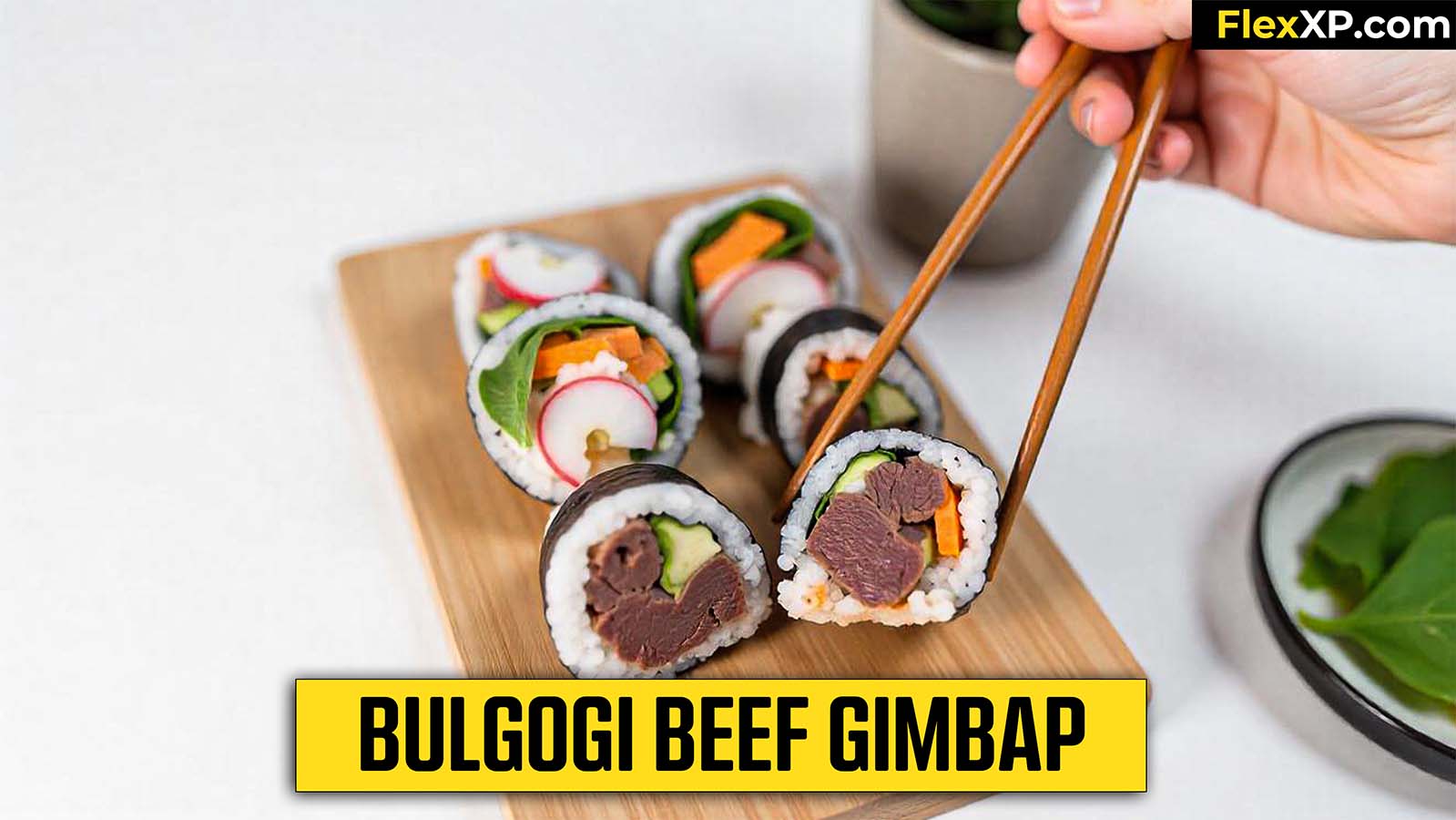Bulgogi Beef Gimbap Recipe

Written By: Stella Petra
Updated: May 28, 2025

Today we’re preparing Bulgogi Beef Gimbap—delicious Korean seaweed rolls loaded with savory beef and fresh veggies. Perfect for a protein-packed lunch, post-workout fuel, or meal prep, this dish helps muscle recovery, provides steady energy, and fits seamlessly into a clean-eating lifestyle. Great for fitness lovers and busy professionals, these rolls are tasty, portable, and satisfying. Let’s roll!
- 8 oz thinly sliced beef (sirloin or ribeye)
- 2 tablespoons soy sauce
- 1 tablespoon brown sugar
- 1 teaspoon sesame oil
- 2 cloves garlic, minced
- 1 teaspoon grated ginger
- 2 cups cooked sushi rice
- 4 sheets roasted seaweed (nori)
- 1 medium carrot, julienned
- 1 cucumber, julienned
- 2 eggs, beaten, cooked into thin omelet strips
- 2 tablespoons toasted sesame seeds
- Cooking oil (for sautéing)
Instructions
- Step 1: First, marinate the beef: combine soy sauce, brown sugar, sesame oil, garlic, and ginger. Toss beef slices in this mixture and set aside for 20 minutes.
- Step 2: Meanwhile, quickly sauté carrots in a hot pan with a drizzle of oil, about 2 minutes. Remove and cool. Next, cook your egg omelet thinly and slice into strips once cooled.
- Step 3: Cook beef in the same pan over high heat until caramelized, about 4–5 minutes. Cool slightly.
- Step 4: Lay a seaweed sheet shiny-side down on a bamboo mat. Spread sushi rice evenly, leaving a 1-inch border at the top. Layer beef, carrots, cucumber, and egg strips across the rice.
- Step 5: Roll tightly using your bamboo mat, sealing with a little water. Slice into bite-sized rounds and finish by sprinkling toasted sesame seeds on top.
Notes
- Bulgogi Beef Gimbap offers a perfect balance of protein, carbohydrates, and healthy fats, ideal for sustained energy and muscle growth. Use lean cuts for reduced fat content. Refrigerate rolls up to 3 days for easy meal prep. You can substitute beef with grilled chicken or tofu. Enhance the taste by serving with spicy gochujang or soy sauce. Best enjoyed fresh or slightly warmed.
Frequently Asked Questions
Can I use chicken instead of beef?
+Yes! Substitute beef with grilled chicken breast for a leaner option.
Is Gimbap served hot or cold?
+Gimbap is best served slightly warm or at room temperature.
How long can I store Gimbap?
+Store refrigerated in an airtight container for up to 3 days.
What sauces pair well with Gimbap?
+Try spicy gochujang, soy sauce, or sesame dipping sauce.
Can I use regular rice instead of sushi rice?
+Short-grain or sushi rice is recommended for best texture and stickiness.
Is Gimbap gluten-free?
+Use gluten-free soy sauce to easily make this dish gluten-free.
Can I make vegetarian Gimbap?
+Absolutely, substitute beef with tofu or extra veggies for a vegetarian twist.
Don’t Wish for It, Work for It – Join the FlexXP Newsletter Today!
Thank you for signing up for the FlexXP Newsletter!
This site is protected and the Google Privacy Policy and Terms of Service apply.